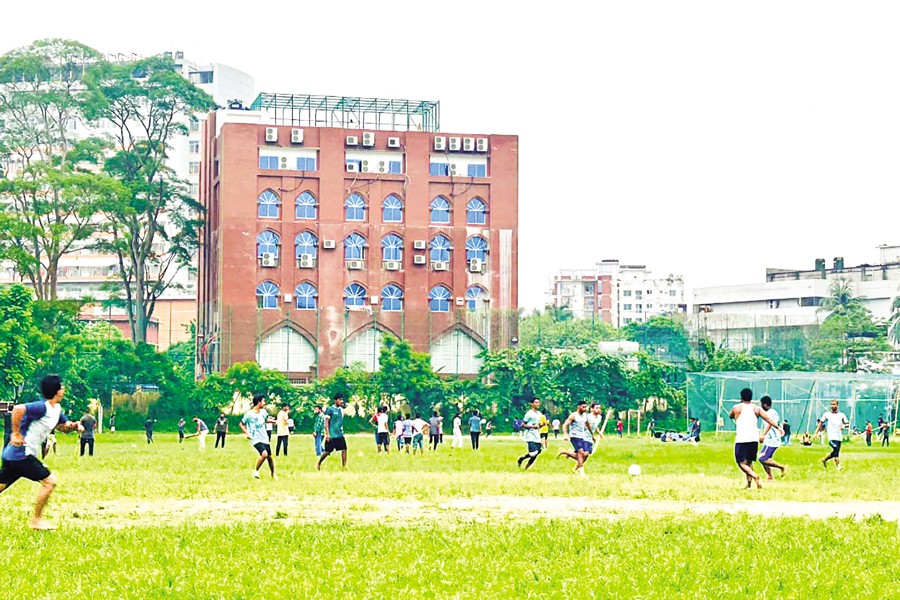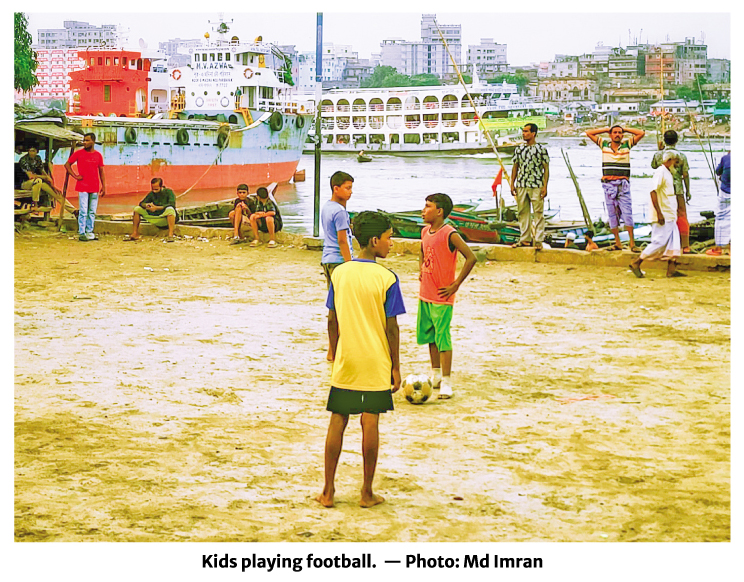
Published :
Updated :

There was a time when Dhaka's evening started with the shouts of children playing in nearby playgrounds and parks. The mischievous little ones escape the door quietly right after their mother takes an afternoon nap. And why? To play to their heart's content. But now, we can say that those days are disappearing. Today, the roads and alleys are filled with car honks, traffic or construction work. The field where they used to play, which holds their best childhood memories, is now being replaced by a shopping mall or a high-rise building.
Then vs Now
Children go out in the playgrounds or fields, playing their favourite football game or hanging out with their friends.
Their laughter, arguments between friends and loud noises echoed from building to building. The little minds played mischievous acts with neighbours and guards, making their lives a living hell.
Dusty fields, golden sky and those cricket and football matches lasted for hours. Some were injured, some were happy, but they went home with a happy yet tense smile, hoping to get rid of their mother's scolding. Those golden days were the best part of their childhood.

Unfortunately, today's children are growing up inside four enclosed walls. You will see them playing on their mobile phones, crammed up in the living room. Now, going to the fields or grounds is just a luxury of opportunity and time for many.
Compared to before, there are fewer playgrounds in the localities, as others are being used for the construction of buildings. The rapid urbanisation is one of the reasons responsible for the disappearance of childhood spaces.
Parents have almost lost the spirit to bring their children to play or just for a simple walk. They hand over their phones or laptops, sit all day, and use them for hours as a source of entertainment.
"The lack of 'Recreational Time' or the proper usage of my leisure is what annoys me the most. I want to enjoy my leisure time with friends doing what I love doing the most, not sitting at home all day," said Sheikh Tuhin Mohammed Tahmid, a student of class eight who loves to play football and cricket. This isn't just about technological advancement; it is about the loss of spaces to play, to breathe.
Rapid urbanisation
New residential areas, housing societies, and buildings are constructed by filling up the vacant spaces. Apart from residential areas, there is a competition in building shopping malls, hotels, business and commercial areas. "The number of changes has caught my eye. I have seen a declining number of playgrounds in my neighbouring areas. As the population is growing, so is the urgency of living and survival," stated Jahin Md. Taseen Bin Tanvir, a student of Dhaka Residential Model College.
Social factors
Due to the increase in human habitats in urban areas, we have pollution and face massive traffic. Crime rates have increased as well, which is concerning for parents.
Parenting style has changed even since, and they limit their time to play outside or don't even let them go outside.
So, the children are finding alternative options for recreation such as: indoor games, rooftop, garage and open areas inside apartments.
"Mostly, I play in my school playground as there are not many places outside of my school. However, I used to play on the rooftop of my apartment building during the COVID-19 period because I wasn't allowed to go outside at all," commented Talha Ahmed Sarker, a student studying in the 8th grade.
The disappearance of playgrounds has been linked to the psychological barriers which prevent children from going to the few remaining places that exist.
The tolls in child development
Physical exercise, teamwork, bonding, and friendship are all the roots for balanced physical and mental growth for a child. And playing any sports can help them achieve it. But today, the lack of outdoor spaces is hindering their proper development.
Physical issues such as, weight gain, obesity, lack of vitamins, body stiffness, and eyesight problems are mostly seen. Reduced physical activity can lead to laziness and a lack of interest in daily chores.
Lack of social interaction and confined lifestyle can lead to adverse effects on children's minds.
If they are deprived of outdoor sports at an early age, they might develop anxiety, laziness and antisocial behaviour. "Because of fewer play areas, I feel like I don't get as much exercise as before. Sometimes I feel bored and stressed out by staying inside for too long," added Talha Ahmed Sarker, talking about his disappointment with the declining number of playgrounds. If this goes on, then children might lose the social bond with peer groups and fail to make essential decisions in the real world.
The use of rooftop and garages provides a decentralised solution for the children and the elderly community. While rooftops can be an alternative, localities and societies are working to create 'child-friendly streets' where children can use public spaces freely with security.
The change of work style and pressure for parents has made them search for alternative options within reach. They often use screens to keep their children engaged as a source of their entertainment. Children become self-centred in their own virtual world, frequently losing connection with the real world and nature.
The crisis of childhood spaces is a multifaceted issue with alternatives, but no proper solution. This is made only on a small scale, within communities or private sector initiatives. However, nothing beats the same old way; going to the field with your friends, returning home happy and satisfied; the memories even fresh and vivid in their little minds.
spurba2003@gmail.com


 For all latest news, follow The Financial Express Google News channel.
For all latest news, follow The Financial Express Google News channel.